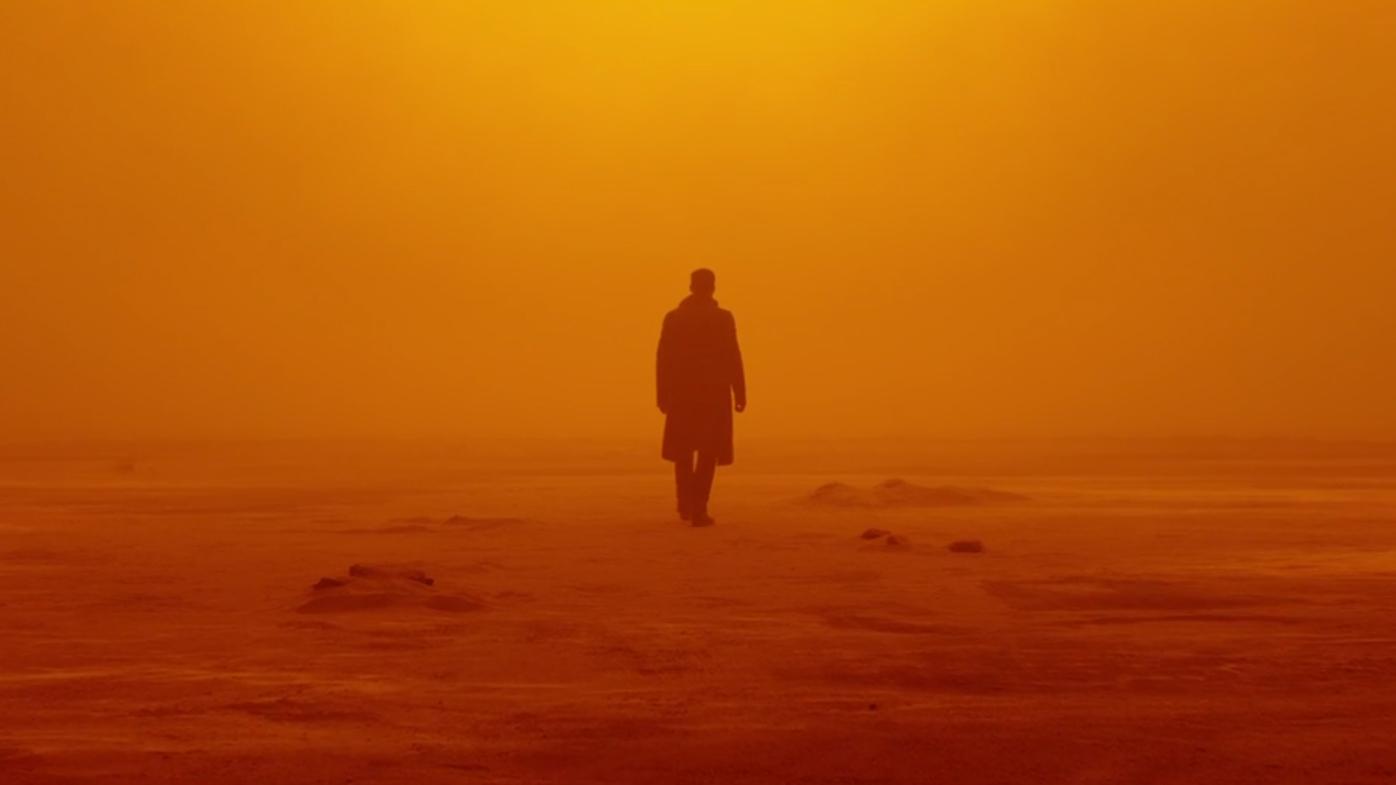Blade Runner is widely recognized as the precursor to modern Science Fiction movies. Philip K. Dick became the go to for source material, overpopulated dirty technology laden metropolises are the setting, and comparing some alien race or robot to humanity or what it means to be human is at least a partial theme for most material since the Ridley Scott 1982 classic. The sequel has been gestating for a long time in Hollywood, waiting for someone to expand what Scott and Harrison Ford started in the original. Turns out Hollywood outsourced its story to Canada and the UK: Director Denis Villeneuve (fresh off a modern sci-fi masterpiece), Ryan Gosling (after jazzing his way into our hearts), and cinematographer Roger Deakins (the Susan Lucci/Marty Scorcese/Al Pacino of cinematographers). The Canadian actor/director confidently pick up the old tale and aim for great heights, but the UK cinematographer actually reaches those heights, generating just a spectacular world of grandeur, mysticism, and melancholy.
(A general SPOILER ALERT in case you want to see the movie without any knowledge of what goes on…)
So K (Ryan Gosling) is a Blade Runner, an officer created to ‘retire’ old replicants (human-looking/feeling robots). K is retiring models that existed during a replicant uprising, where data on their whereabouts is minimal due to a global IT blackout 20 years ago. After one retiring, K encounters a potentially world order shattering situation that his boss Lt. Joshi (Robin Wright) wants him to keep quiet about. However, after talking with his girlfriend Joi (Ana de Armas), K starts to dig deep into the case, and learns how former Blade Runner Rick Deckard (Harrison Ford) might be involved. K is not the only one interested in this case though: Niander Wallace (Jared Leto) and his assistant Luv (Sylvia Hoeks) of the Wallace corporation mass produce replicants currently, and they also desire to “talk” to Deckard and try to keep his secrets quiet.
There are two things people remember most about Blade Runner: it’s vision of the future, and its themes on the nature of humanity. To be a successful sequel, Blade Runner 2049 would have to grow and expand the universe that the original set up. Enter Roger Deakins, visual storytelling genius. Remember the final shot of the Shawshank Redemption? The epic gradeur of the Skyfall lone house showdown? Any of the Coen Brothers iconic images in Fargo, No Country for Old Men, or A Serious Man? That’s all Deakins. Villeneuve has worked with the director previously on Sicario and Prisoners (which also were excellently shot), but I’m guessing Villeneuve used those as test runs for Blade Runner 2049, where he unleashes the cinematographer to onslaught the audience’s eyeballs. Each image, tiny and small, sets a mood or feeling for the audience. Here are two examples: when K finally finds Deckard’s location (grand), the color palette and vastness give you feelings of dread and terror, and your heart races a little bit with each footstep or noise you hear. Then there’s a scene where 2 people are talking with a clear barrier between them (small). One character takes a look at a memory, and the reflection of the other’s face is in the shot, letting you see both people react without using a cheesy split screen. This attention to detail: the shadows in a hallway, lush color palettes, and symbiotically merging these images into Villeneuve’s vision showcase why Deakins is one of our best working cinematographers not only today, but of many generations, and why I believe his Oscar drought will finally end: Blade Runner 2049 is Deakins’s masterpiece.
Unfortunately, for me, the story doesn’t hold up to Deakins’s perfection. Blade Runner 2049 uses extremely lethargic plotting: someone slowly walks into a room, monologues go on for 2-5 minutes too long, a person riding in a car spends lots of time staring at a computer screen, etc. When this works, it is VERY effective, like K’s hunt for Deckard or establishing world shots of garbage dumps and unending apartment complexes. But too often Blade Runner 2049 treats deliberate action as significant, when it just drags the story out unnecessarily (over 2 and a half hours, I yawned a few times). Similar to the original Blade Runner, the sequel focuses on the nature of humanity, but I couldn’t help but recall movies that covered the material better than this one. Joi’s relationship with K (one of the more intriguing subplots) recalls Spike Jonze’s Her frequently, but Her is actually trying to say something about relationships, where Blade Runner’s scene is just a really cool use of CGI that abandons this plot in the third act. There’s a memory subplot that’s a good whodunit caper, but holds zero weight compared to Dark City as another example. It’s almost as if, Villeneuve settled on a detective story as his main through line, and just casually dropped in stuff that was kinda interesting, hoping people would project more significance to the story with the little deviations. Most involved (in particular de Armas and Hoeks) give it their all, but when your story is mostly hollow at its center, you can only save so much with stellar acting.
I’m overly critical of Blade Runner 2049 because of the importance of the original, and the talent involved behind the scenes. A sequel to a classic needs to really push to something special for people to take it seriously. In 20 years, I can see people talking about Blade Runner 2049’s visual appearance in a film school class. But when the professor asks what is this movie about, people will shrug or not care or say something about replicants and humans, but nothing specific. Also, Mr. Villeneuve, I really like you, I do, but please don’t put a bad guy in a movie that only speaks cryptically. It doesn’t make any sense, I mean, who answers a question with a crazy monologue other than someone you KNOW is trying to scam you?

